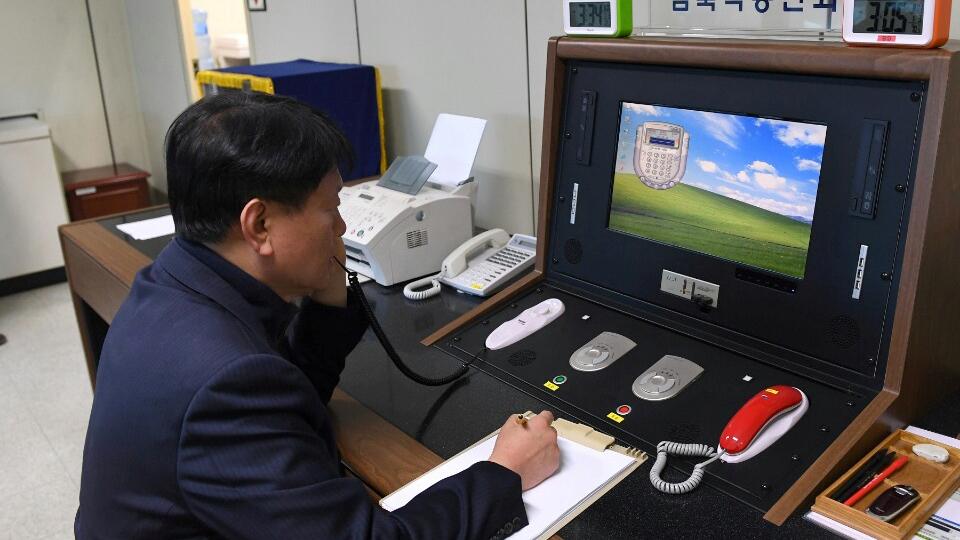North Korea reopens border hotline with the South
A South Korean government official checks the direct communications hotline to talk with the North Korean side at the border village of Panmunjom, South Korea, Jan. 3, 2018.
North and South Korea on Wednesday reopened a cross-border hotline which had been shut down since 2016, forging ahead with peace overtures despite taunts from US President Donald Trump who said he has a "much bigger" nuclear button than Kim Jong-un.
The hotline was restored after Seoul proposed high-level talks in response to an olive branch from the North's leader, who has offered to send a team to next month's Winter Olympics in the South.
"The phone conversation lasted 20 minutes," a South Korean Unification Ministry official told AFP, adding details were not known immediately.
Kim's overtures to the South marked a rare softening in tone. Tensions have surged in recent months following a flurry of North Korean missile launches and its most powerful nuclear test yet.
Seoul responded with an offer to hold talks on January 9 — the first since 2015 — to discuss "matters of mutual interest" including the North's Olympic participation.
But Kim's New Year address also included a warning to the US that he has a "nuclear button" on his table, prompting a furious response from Trump via Twitter.
"North Korean Leader Kim Jong Un just stated that the 'Nuclear Button is on his desk at all times.'
"Will someone from his depleted and food starved regime please inform him that I too have a Nuclear Button, but it is a much bigger & more powerful one than his, and my Button works!" he said.
The tweet generated Twitter responses largely of scorn and alarm.
"This borders on presidential malpractice," said Democratic Senator Ed Markey.
"Our President is a child. 'Mine is bigger than yours' may sound tough on the playground, but this is no juvenile affair. Literally millions of lives are at stake," tweeted Colin Kahl, a former national security adviser to then Vice-President Joe Biden.
But Trump's ambassador to the United Nations Nikki Haley maintained the tough line, playing down Seoul's offer to hold talks. These would be a "band-aid" unless denuclearization was also up for discussion, she said.
US State Department spokesman Heather Nauert also warned that Kim "may be trying to drive a wedge of some sort between the two nations — between our nation and the Republic of Korea (South Korea)."
But the tentative rapprochement seemed to be moving ahead on Wednesday, with Kim welcoming Seoul's support for his overtures, according to Ri Son-gwon, the head of North Korea's agency handling inter-Korean affairs.
Hotline 'very significant'
The two countries, divided by a Demilitarized Zone since the end of the 1950-53 Korean War, last held high-level talks in 2015 to try to ease tensions.
The hotline in the border truce village of Panmunjom remained operational until February 2016. It was shut down when relations worsened over a dispute involving the jointly operated and now closed Kaesong industrial complex.
Seoul welcomed Pyongyang's decision to reopen the hotline as "very significant."
Its President Moon Jae-In has long favored engagement with the North, but the Trump administration insists the regime must give up its weapons drive before any negotiations can take place.
North Korea has shrugged off a series of tougher sanctions and heightened rhetoric from Washington as it drives forward with its weapons program.
It says it needs nuclear weapons to protect itself from a hostile Washington and has striven to create a warhead capable of targeting the US mainland with an atomic warhead.
Moon on Tuesday welcomed Kim's olive branch as a "positive response" to Seoul's hopes that the Pyeongchang Olympics would be a "groundbreaking opportunity for peace."
But any rapprochement between the two countries would take place against a backdrop of suspicion, if not outright hostility, by Washington. Trump and Kim have exchanged angry insults since the US leader took office a year ago.
Trump has mocked Kim as "fat" and a "little rocket man." Kim, for his part has described Trump as a "mentally deranged US dotard."
Twitter reaction to Trump's "button" remark was largely scornful.
Go Myong-Hyun, of the Asan Institute for Policy Studies in Seoul, told AFP that North Korea was using the South as a "shield" as it tries to fend off sanctions and pressure from the US.
"If the South becomes the North's dialogue partner, the US-South Korea alliance will face difficulties," he told AFP.
by Hwang Sunghee/AFP
The story you just read is accessible and free to all because thousands of listeners and readers contribute to our nonprofit newsroom. We go deep to bring you the human-centered international reporting that you know you can trust. To do this work and to do it well, we rely on the support of our listeners. If you appreciated our coverage this year, if there was a story that made you pause or a song that moved you, would you consider making a gift to sustain our work through 2024 and beyond?
